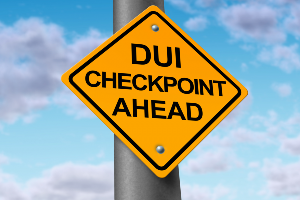 Have you been stopped by police officers at a DUI checkpoint in Pennsylvania and asked if you’ve consumed alcohol before driving? These checkpoints are often questionable, but they are legal under strict circumstances in Pennsylvania. Police officers must remain stationary at a distinct checkpoint location for several hours while conducting DUI stops. While police do not need reasonable suspicion to stop your vehicle at a checkpoint, they must follow the set rules for stopping drivers who travel through the checkpoint.
Have you been stopped by police officers at a DUI checkpoint in Pennsylvania and asked if you’ve consumed alcohol before driving? These checkpoints are often questionable, but they are legal under strict circumstances in Pennsylvania. Police officers must remain stationary at a distinct checkpoint location for several hours while conducting DUI stops. While police do not need reasonable suspicion to stop your vehicle at a checkpoint, they must follow the set rules for stopping drivers who travel through the checkpoint.
Saint Patrick’s Day is one of the most favored days of the year for law enforcement to set up DUI checkpoints in Pennsylvania. If you’ve been arrested for driving under the influence, contact the DUI defense lawyers at Rubin, Glickman, Steinberg & Gifford today for help.
How Do DUI Checkpoints Operate in Pennsylvania?
DUI checkpoints require stringent standards to be lawful in Pennsylvania. Some of the rules surrounding DUI checkpoints include:
- They must be planned by police administrators and not by officers.
- They must be advertised in the media with signs near the location.
- Police administrators must set objective criteria to decide which drivers to stop.
For example, if police administrators decide officers will stop every eighth vehicle, officers must abide by that guideline.
If your vehicle is the eighth one to pass through the checkpoint, an officer will approach your car and ask whether you’ve been drinking. If you acknowledge you have or if your conduct leads the officer to suspect you’re driving under the influence of drugs or alcohol, they’ll request that you move forward to the second area of the checkpoint. At that point, they’ll ask you to submit to field sobriety tests.
Can I Refuse Field Sobriety Tests at a DUI Checkpoint?
Whether at a DUI checkpoint or traffic stop, you have the right to refuse field sobriety tests along with preliminary roadside breath tests according to Pennsylvania law. Additionally, you are not legally required to answer any of the officer’s questions at the DUI checkpoint other than providing your:
- Name
- Driver’s license
- Vehicle registration
- Insurance
If you’re asked any other questions, you can respectfully decline to answer. Outside of the required identifying information, you should have your attorney by your side before answering any further questions police may ask.
Remember, the prosecution can use anything you say against you if you’re arrested and face criminal charges. In that case, you’ll be required to submit to a post-arrest breath or blood test, which, unlike the roadside breath test and field sobriety tests, you cannot refuse. If you do, you’ll face several penalties, including an automatic driver’s license suspension.
Are DUI Checkpoints Legal in Pennsylvania?
DUI checkpoints are legal in Pennsylvania under 75 Pa. C.S. § 6308(b). According to this law, police officers are permitted to stop drivers when they have reasonable suspicion to believe they’ve violated a law or during a systematic program, such as a stop at a DUI checkpoint.
The words “systematic program” have been understood as giving legal power to set up DUI checkpoints in Pennsylvania when the required guidelines are followed. However, it’s important to note that the burden of proof lies with the prosecution to demonstrate that law enforcement conducted a DUI checkpoint legitimately should the stop be contested.
What Standards Make a DUI Checkpoint Legal in Pennsylvania?
If you’re arrested at a DUI checkpoint in Pennsylvania and argue that it was not lawful, the courts will consider how invasive the stop was and whether law enforcement followed specific procedures in a non-discriminatory manner.
If a DUI checkpoint did not fully abide by the set standards, an experienced DUI defense lawyer would submit a petition to suppress all evidence derived from that stop. To establish whether the checkpoint was legitimate, your attorney may evaluate the following considerations:
- How long you were stopped at the DUI checkpoint
- Whether police administrators or officers set up the DUI checkpoint
- Whether the DUI checkpoint was appropriately advertised to the public
- Documents and data used to organize the DUI checkpoint and its site
- Whether there was prior administrative approval for the DUI checkpoint
- Whether officers abided by the objective criteria establishing which drivers to stop
- Names and employment associations of all of the officers who took part in the DUI checkpoint
After your defense lawyer has an opportunity to assess this information, they’ll be able to offer you sound guidance on how to move forward with your case.
Arrested at a DUI Checkpoint in Pennsylvania? Get Help from an Experienced DUI Defense Attorney!
If you are celebrating Saint Patrick’s Day in Pennsylvania this March, make sure you plan to have a designated driver so you can safely celebrate without worrying about DUI checkpoints. If you’ve been arrested after being stopped at a DUI checkpoint, you may still have legal recourse! Get in touch with a skilled Montgomery County DUI defense lawyer at Rubin, Glickman, Steinberg & Gifford today!
For over 65 years, our DUI defense attorneys have passionately advocated for our clients’ rights and freedoms across Southeast Pennsylvania. We can help establish whether the DUI checkpoint was carried out legally and defend your rights. To speak with a skilled DUI defense attorney over a free case review, complete our contact form or call 215-822-7575 today.

Rubin, Glickman, Steinberg & Gifford P.C.
Pennsylvania Attorney's
March 18, 2021








